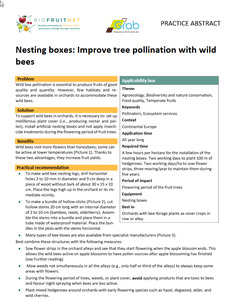{Tool} Nesting boxes: Improve tree pollination with wild bees (BIOFRUITNET Practice Abstract). Creator(s): Jacquot, Maxime and Parveaud, Claude-Eric. Issuing Organisation(s): GRAB - Groupe de Recherche en Agriculture Biologique. Biofruitnet Practice Abstract, no. 033. (2022)
|
PDF
- Published Version
- English
(Nesting boxes: Improve tree pollination with wild bees)
265kB | |
|
PDF
- Published Version
- French/Francais
(Nichoirs : Améliorer la pollinisation des arbres par les abeilles sauvages)
272kB | |
|
PDF
- Published Version
- German/Deutsch
(Nistkästen: Verbesserung der Bestäubung von Obstbäumen durch Wildbienen)
296kB | |
![[thumbnail of 2024-04-19 15_18_18-Nesting boxes_ Improve tree pollination with wild bees - 33_PA_Final.pdf – Mozil.png]](/44721/7.hassmallThumbnailVersion/2024-04-19%2015_18_18-Nesting%20boxes_%20Improve%20tree%20pollination%20with%20wild%20bees%20-%2033_PA_Final.pdf%20%E2%80%93%20Mozil.png)  Preview |
Image (PNG)
- Cover Image
- English
117kB |
Document available online at: https://orgprints.org/44721
Summary in the original language of the document
Wild bees visit more flowers than honeybees; some can be active at lower temperatures (Picture 1). Thanks to these two advantages, they increase fruit yields.
Practical recommendation
• To make wild bee nesting logs, drill horizontal holes 2 to 10 mm in diameter and 9 cm deep in a piece of wood without bark of about 30 x 15 x 10 cm. Place the logs high up in the orchard or its immediate vicinity.
• To make a bundle of hollow sticks (Picture 2), cut hollow stems 20 cm long with an internal diameter of 2 to 10 cm (bamboo, reeds, elderberry). Assemble the stems into a bundle and place them in a tube made of waterproof material. Place the bundles in the plots with the stems horizontal.
• Many types of bee boxes are also available from specialist manufacturers (Picture 3).
Best combine these structures with the following measures:
• Sow flower strips in the orchard alleys and see that they start flowering when the apple blossom ends. This allows the wild bees active on apple blossoms to have pollen sources after apple blossoming has fin-ished (see Further reading).
• Mow weeds not simultaneously in all the alleys (e.g., only half or third of the alleys) to always keep some areas with flowers.
• During the flowering period of trees, weeds, or plant cover, avoid applying products that are toxic to bees and favour night spraying when bees are less active.
• Plant mixed hedgerows around orchards with early flowering species such as hazel, dogwood, alder, and wild cherries.
| EPrint Type: | Practice tool |
|---|---|
| What problem does the tool address?: | Wild bee pollination is essential to produce fruits of good quality and quantity. However, few habitats and resources are available in orchards to accommodate these wild bees. |
| What solution does the tool offer?: | To support wild bees in orchards, it is necessary to: set up melliferous plant cover (i.e., producing nectar and pollen), install artificial nesting boxes and not apply insecticide treatments during the flowering period of fruit trees. |
| Country: | France |
| Type of Practice Tool: | Practice abstracts |
| Keywords: | pollinators, ecosystem services, apiculture |
| Agrovoc keywords: | Language Value URI English pollinators http://aims.fao.org/aos/agrovoc/c_6074 English ecosystem services http://aims.fao.org/aos/agrovoc/c_1348040570280 English apiculture http://aims.fao.org/aos/agrovoc/c_529 |
| Subjects: | Environmental aspects > Biodiversity and ecosystem services Crop husbandry > Production systems > Fruit and berries |
| Research affiliation: | European Union > Horizon 2020 > Biofruitnet France > GRAB - Groupe de Recherche en Agriculture biologique European Union > Organic Farm Knowledge |
| Horizon Europe or H2020 Grant Agreement Number: | 862850 |
| Related Links: | https://organic-farmknowledge.org/tool/44721, https://biofruitnet.eu |
| Project ID: | ofk |
| Deposited By: | Basler, Andreas |
| ID Code: | 44721 |
| Deposited On: | 09 Dec 2022 16:45 |
| Last Modified: | 20 May 2025 10:30 |
| Document Language: | English, German/Deutsch, French/Francais |
| Status: | Published |
Repository Staff Only: item control page


